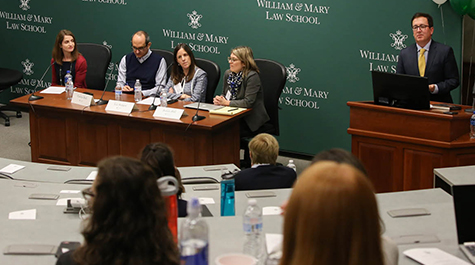Scholars Convene for Bill of Rights Journal Symposium on Constitutional Rights
On March 15 and 16, the William & Mary Bill of Rights Journal hosted a symposium on “Constitutional Rights: Intersections, Synergies, and Conflicts.” The event brought together constitutional law scholars from around the country to discuss the issues that arise from relationships between the various freedoms guaranteed by the Bill of Rights.
“One of the most fascinating things about rights is that, although they are typically thought of as individual guarantees, they actually quite frequently intersect and are in conversation with one another,” said Professor Timothy Zick, as he introduced the symposium’s theme. “That is true in the courts, of course, as the courts develop doctrines of constitutional rights, but it is also true in public discourse and, as the scholars before us demonstrate, in legal scholarship as well.”
The visiting scholars discussed the papers they are preparing for publication in the Bill of Rights Journal, which involve the relationships between various constitutional rights in a wide range of historical and cultural environments. Speakers discussed situations where the exercise of one citizen’s rights conflicts with the rights of others, as well as how the courts apply rights doctrine in situations that implicate multiple civil liberties at once.
Throughout the event, speakers responded to feedback from fellow panelists, William & Mary faculty moderators, and students in the audience, who proposed new avenues of research and raised potential challenges to the scholars’ claims.
The first panel, moderated by Professor Laura Heymann, discussed the freedom of expression, gender equality and privacy. Carlos Ball, Distinguished Professor of Law and Research Scholar at Rutgers University, spoke about gender stereotyping discrimination and free expression. Professor Liz Sepper from Washington University School of Law discussed feminist legal responses to the Jaycees and other restrictive men’s clubs. Finally, Jessie Hill, the Associate Dean for Academic Affairs and Professor of Law at Case Western Reserve University, discussed the relationship between free speech, religious freedoms and abortion rights.
Next, Professor Jeffrey Bellin moderated a panel on freedom of expression, firearms and political change. Professor Greg Magarian from Washington University School of Law discussed the effects of gun ownership on freedom of speech, and Professor Darrell Miller of Duke University School of Law discussed firearm restrictions in sensitive social areas.
In a panel hosted by Professor Tara Grove, Professor Debbie Hellman of the University of Virginia School of Law spoke about the relationship between equal protection and due process principles, while Professor Nan Hunter from the University of Georgetown Law Center presented a paradigm for the changing nature of civil rights movements.
The symposium continued on Saturday morning with a panel on enforcing rights hosted by Professor Allison Orr Larsen. Professor Michael Coenen of Seton Hall Law School began by presenting several responses to overlap between constitutional rights. Professor Robert Tsai of American University’s Washington College of Law spoke about the borrowing of principles between rights doctrines. Finally, Duke Law Professor Joseph Blocher and third-year student Luke Morgan presented their paper on the exchange of legal doctrine between various constitutional rights.
The final group of panelists, moderated by Professor Zick, discussed religious expression and equality. Douglas Laycock, Professor of Law and Religious Studies at the University of Virginia, spoke about balancing conflicting rights of equality and religious expression. Nelson Tebbe, Professor of Law at Cornell Law School and Visiting Faculty Fellow at the University Center for Human Values at Princeton University, discussed democratizing the First Amendment by accounting for the influence of wealth on personal expression. Professor Ashutosh Bhagwat of UC Davis discussed the problem of compelled speech, particularly in the Masterpiece Cakeshop case. Finally, Professor Caroline Mala Corbin from the University of Miami School of Law discussed the intersection of privilege and nationalism in religiously-motivated discrimination.
“Rights intersect, they overlap, they sometimes conflict with one another,” Professor Zick said as he explained the importance of the symposium’s comparative approach. “Doctrines of rights have many similarities, but also quite a few differences, distinctions and inconsistencies.”
The BORJ Symposium is hosted each year by the William & Mary Bill of Rights Journal and the Institute of Bill of Rights Law. The Bill of Rights Journal is the third-most cited Constitutional Law journal in the United States. It is a student-run publication of scholarship about the Bill of Rights and related legal doctrine.
About William & Mary Law School
Thomas Jefferson founded William & Mary Law School in 1779 to train leaders for the new nation. Now in its third century, America's oldest law school continues its historic mission of educating citizen lawyers who are prepared both to lead and to serve.
